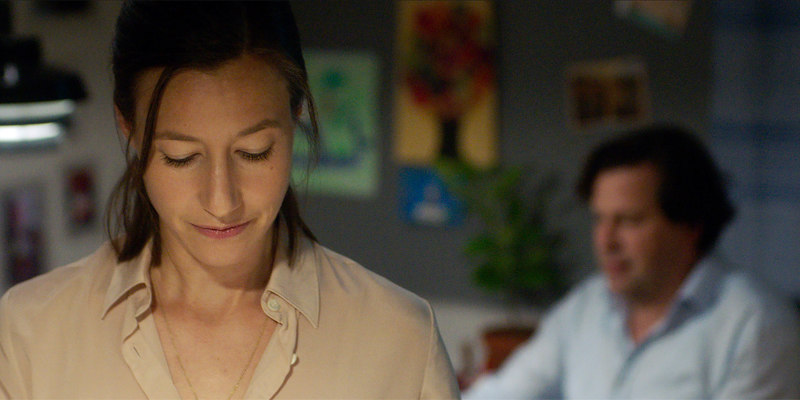
Review by Benjamin Poole
Directed by: Jan Speckenbach
Starring: Johanna Wokalek, Hans-Jochen Wagner, Inga Birkenfeld, Andrea Szabová, Ondrej Koval

You wonder why it doesn’t happen more often. Think of the records you used to love but now can’t bear to hear; the TV shows you devoted months of your life to which you now look back upon in embarrassment; the old clothes you wouldn’t be seen dead in nowadays. The mate who you were so tight with back in the day, but now who, when you pass each other in Primark or Tesco you silently, mutually agree with not to acknowledge each other. If you can grow out of music, clothes and friendships, why not established relationships? It’s a poser explored in Jan Speckenbach’s fascinating Freedom wherein, according to the imdb blurb, "a mother goes away, leaving her husband and their two children in limbo. She is driven by a force she cannot ignore: freedom." Clearly, though, it’s not quite as straightforward as imdb makes it out. The word 'freedom' has connotations of excitement and self-actualisation, but Nora’s (Johanna Wokalek - smashing) supposed liberation is entirely conditional on the varied circumstances she finds herself within, contexts which stretch her identity and sexuality in ways which could be considered challenging, at least certainly more exacting than the safe indifference of a middle class family life. If it’s freedom she wants, she ain’t finding it where she’s looking. So, what exactly is driving her?


Within this German production the elefant in the room, the usp, is, of course, the matter of Nora’s gender. If this was a story about a fella up and leaving his family in exchange for carnal, vagabond adventures, Freedom probably wouldn’t have even received funding, so commonplace is that story. However, the idea of a woman chucking her family for, on the face of this film at least, no discernible reason is scarce, and, perhaps within our stacked cultural expectations, taboo too. We assume that women are nurturing, that they’re steadfast, and then we implicitly make excuses for men who decide to fuck off, rationalising about wild oats and biological imperatives (I’m so-so on Lionel Shriver, but I will always love 'We Need to Talk About Kevin' for how, non-judgementally, it poses the rare question: what happens when you as a mother just can’t stand your own kid? Especially if that kid is a bit of a dick?).
We meet Nora on a bus, where she bullshits the driver about missing her stop so she can kill time on the round trip. The bus driver, stopping for lunch, is then mugged by some neddy kids but Nora, witness to the petty theft, simply absconds from the crime scene, leaving the traumatised driver to his impotent fury. The film builds its mise-en-scene around transactional urban loci; sex clubs, hotels, public transport; a discrete reminder that while partners may walk, it is money that talks and perhaps anchors us to a comfortable, if entirely unsatisfying, status quo. This opening arrangement is indicative of Freedom: Nora avoiding responsibility and human interaction as she finds herself in increasingly risky situations, continually impelled to keep-keep-keep moving away from the past.

With her (utterly incredible) asymmetrical hairstyle which, half shaved/half long in that way which only mainland European women seem to be able to pull off, implies her dual nature, we see Nora pick up a twenty-something lad in a supermarket for a shag (choice dialogue: "Do you like the taste of my pussy?"), and then fall in with an Austrian couple, the female half of which spends her nights working in a Manumission style club administering live sex shows. I was expecting a kind of deSadean picaresque from Freedom, with Nora, like Juliette in 'L'Histoire de Juliette ou les Prospérités du vice', bumbling from one fleshly excitement to the next, with some sort of emancipatory subtext bubbling underneath. No dice. None of Nora’s adventures seem to bring her any satisfaction, and so it's on to the next interval, as Freedom refuses us any such pat conclusions.

We cut back throughout to Nora’s fella, barely coping when his teen daughter is caught smoking a joint on the balcony, balancing his stressful day job as a solicitor with a tentative affair with a client, and appearing on telly to make appeals for Nora, whom the police think is probably dead (the grim satire of assuming it's more likely a woman would be murdered than that she’d left of her own accord…). He’s as confused as he is traumatised, with the ‘limbo’ imdb specifies consisting of not-knowing and not-being-able-to-carry-on, and just wanting some answers. Him and Nora both, as his estranged wife seems just as confused by her imperative actions. This essential ambiguity, this refusal to explain, imbues Freedom with an uncomfortable, and, if we’re being honest, recognisable uncertainty about our lot: the expectation to settle for one-size-fits-all family life, and the contradictory urges which persuade us otherwise.

Freedom is on DVD July 2nd from Corinth Films.
"A worthy continuation of what might be Hollywood's greatest franchise."— 𝕋𝕙𝕖𝕄𝕠𝕧𝕚𝕖𝕎𝕒𝕗𝕗𝕝𝕖𝕣.𝕔𝕠𝕞 🎬 (@themoviewaffler) June 29, 2019
CREED II is on @NetflixUK now.
Read @hilliseric's reviewhttps://t.co/jtlqHWKwQY pic.twitter.com/qxkTFI98Lp

